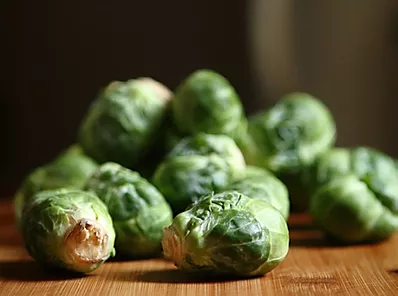Brussels Sprouts
- jlrosner
- Jan 13, 2020
- 2 min read
Updated: Jul 28, 2020

Brussels sprouts are a member of the cruciferous vegetable family, along with cauliflower, kale, broccoli, cabbage and turnip greens. They are thought to be native to Belgium, specifically to a region near its capital, Brussels, after which they are named. In the U.S., almost all Brussels sprouts are grown in California. They are available year round; however, they are at their best from autumn through early spring when they are at the peak of their growing season.
Brussels sprouts resemble miniature cabbages. They are typically sold separately but can sometimes be found still attached to the stem. At a minimum, include cruciferous vegetables as part of your diet 2-3 times per week, and make the serving size at least 1-1/2 cups.
Nutrient Profile:
They are an excellent source of vitamin C and vitamin K. They are a very good source of folate, manganese, vitamin B6, dietary fiber, choline, copper, vitamin B1, potassium, phosphorus, and omega-3 fatty acids. They are also a good source of iron, vitamin B2, protein, magnesium, pantothenic acid, vitamin A, niacin, calcium, and zinc. In addition to these nutrients, Brussels sprouts contain numerous disease-fighting phytochemicals.
Health Benefits:
Detoxification Support: The presence of activated glucosinolates and sulfur containing nutrients, as well as, vitamin C and manganese help provide detox support.
Antioxidant Support (cancer protection): The risk of oxidative damage from overly reactive oxygen-containing molecules can result in cumulative damage and lead to the development of cancer. Brussels sprouts contain conventional antioxidants vitamin C, vitamin A (in the form of beta-carotene) and manganese and other antioxidant polyphenols which help to provide support.
Anti-inflammatory Support: Chronic unwanted inflammation is a risk factor for many types of cancer. Brussels sprouts provide anti-inflammatory support through glucosinolates, vitamin K and omega-3 fatty acids.
Cardiovascular Support: Cardiovascular disease is now believed to be due in part to unwanted inflammation in our blood vessels. Brussels spouts help fight this inflammation through the presence of sulforphane. They also help provide cardiovascular support by helping to lower cholesterol through their rich supply of fiber.
Digestive support: The fiber content helps with digestive support. Also the presence of sulforaphane helps protect the health of our stomach lining by preventing bacterial overgrowth of Helicobacter pylori (H pylori).
Selection and Storage: Select Brussels sprouts that are firm, compact, and vividly green. They should be free of yellowed or wilted leaves and should not be puffy or soft in texture. Avoid those that have perforations in their leaves as this may indicate that they have aphids residing within.
Keep unwashed and untrimmed Brussels sprouts in the vegetable compartment of the refrigerator. Stored in a plastic bag, they can be kept for 10 days.
Individual Concerns: People with Thyroid Dysfunction: Brussels sprouts may contain substances (especially found in cruciferous vegetables) which may cause swelling of the thyroid gland (goiter). This may lead to the thyroid not being able to produce as many of the hormones that are needed for regulating metabolism. Consumption of these vegetables should be altered but not eliminated in individuals with thyroid dysfunction. For example, steam, cook or ferment these cruciferous vegetables as the heat alters the molecular structure within the vegetables and thus eliminates the goitrogenic effect. f you have normal thyroid function and consume adequate amounts of iodine, these vegetables will have no effect on your thyroid and may be eaten liberally.
Recipe Suggestion: This is a wonderful and very flavorful salad: Kale and Brussels sprouts salad with walnuts, parmesean and lemon-mustard dressing from Once Upon A Chef.

댓글